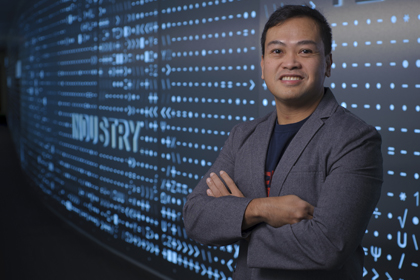On Wednesday, September 11, Leo Anthony Celi, M.D., M.S., M.P.H., presented the Annual Stetson Lecture in Technological Advances in Medicine.

Leo Anthony Celi, M.D., M.S., M.P.H. (Photo courtesy of Dr. Celi)
On Wednesday, September 11, the Larner College of Medicine at the University of Vermont, John W. Stetson ’56 M.D.’60 , and Roberta B. Stetson '57, welcomed Leo Anthony Celi, M.D., M.S., M.P.H., to present the Annual Stetson Lecture in Technological Advances in Medicine. The presentation, titled "Using the Hype Around AI to Redesign the Medical Knowledge System," was made to a full crowd of faculty, staff, and students from the College, UVM, and the UVM Medical Center.
Celi received his medical degree from the University of the Philippines, his master of science degree from the Massachusetts Institute of Technology (MIT), and his master of public health degree from Harvard School of Public Health. He is currently the clinical research director and principal research scientist at the MIT Laboratory for Computational Physiology, an intensive care physician at Beth Israel Deaconess Medical Center, and a faculty member at Harvard Medical School.
Celi is also the co-creator of two open-access Intensive Care Unit databases - the Medical Information Mart for Intensive Care and the Philips-MIT eICU Collaborative Research Database. His research focuses on building "decision support tools to provide individualized test and treatment recommendations and to understand disease trajectory through the application of machine learning to ICU data."
This year, Celi was highlighted in
Forbes Magazine as one of Deep Knowledge Analytics' "Top 100 AI Leaders in Drug Discovery and Advanced Healthcare." He is the founder of Sana, "an open-source cellphone-based software that allows capture and transmission of any type of medical data through cellular networks to a back-end electronic medical record system that a remote expert can access to provide real-time decision support to front-line community healthcare workers."
During his September 11 presentation, Celi shared his insights on using data science to improve health care outcomes, the value and limitations of algorithms, the use of research in day-to-day operations to improve population health, and the provider's role as "a contributor and custodian of the knowledge system."
The Stetson Lecture is supported by a fund established through a $100,000 estate gift from UVM alumni Dr. John and Mrs. Roberta Stetson. A Rutland resident and UVM Wilbur Fund scholarship recipient, Stetson had a 39-year career as an orthopaedic surgeon. Two personal experiences highlighted the impact of technological advances in medicine and inspired him and his wife to create the Stetson lectureship at the Larner College of Medicine. The first was his own double-knee replacement in 2015 in Syracuse, N.Y., and the second, which occurred during his post-surgical rehabilitation, was learning about how an innovative and minimally-invasive procedure called TAVR (Transcatheter Aortic Valve Replacement) had completely changed the life of an elderly woman who had formerly struggled to breathe.